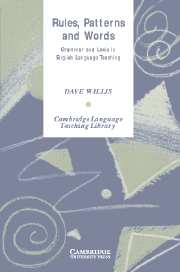Book contents
- Frontmatter
- Contents
- Acknowledgements
- 1 What is taught may not be what is learnt: Some preliminary questions
- 2 Grammar and lexis and learning
- 3 Developing a teaching strategy
- 4 The grammar of structure
- 5 The grammar of orientation: The verb phrase
- 6 Orientation: Organising information
- 7 Lexical phrases and patterns
- 8 Class: The interlevel
- 9 The grammar of spoken English
- 10 A final summary
- References
- Subject index
- Name index
10 - A final summary
Published online by Cambridge University Press: 03 May 2010
- Frontmatter
- Contents
- Acknowledgements
- 1 What is taught may not be what is learnt: Some preliminary questions
- 2 Grammar and lexis and learning
- 3 Developing a teaching strategy
- 4 The grammar of structure
- 5 The grammar of orientation: The verb phrase
- 6 Orientation: Organising information
- 7 Lexical phrases and patterns
- 8 Class: The interlevel
- 9 The grammar of spoken English
- 10 A final summary
- References
- Subject index
- Name index
Summary
Language learning and language development
In Chapter 1 I began by pointing out that what is ‘taught’ is very often not learnt. There is a gap between learners' ability to manipulate language as a system of rules, and their ability to use that language for spontaneous communication. If we think of learning as learning to use the language system, then we cannot predict or control what will be learnt. Some relatively simple items like the terminal third person-s in the present simple tense, or the formation of do-questions are oddly resistant to teaching. It is hardly surprising that, in the short term, complex systems like tense are not affected at all, even by careful teaching.
How, then, do learners progress? It seems that, to a large extent, learning is a natural developmental process. Yet, at the same time, there is evidence that instruction does help learners. Given the right kind of instruction, learners are likely to progress more rapidly, and to reach a higher standard of attainment. But what sort of instruction is most likely to help learners? Both research and our experience in the classroom suggest that learning is unpredictable. If teachers attempt to control what is learnt they will certainly fail. If they take the elimination of learner error as their overwhelming priority, they will certainly fail. It may even be the case that control and a focus on eliminating error often challenge rather than reinforce the developmental process.
- Type
- Chapter
- Information
- Rules, Patterns and WordsGrammar and Lexis in English Language Teaching, pp. 212 - 226Publisher: Cambridge University PressPrint publication year: 2003

